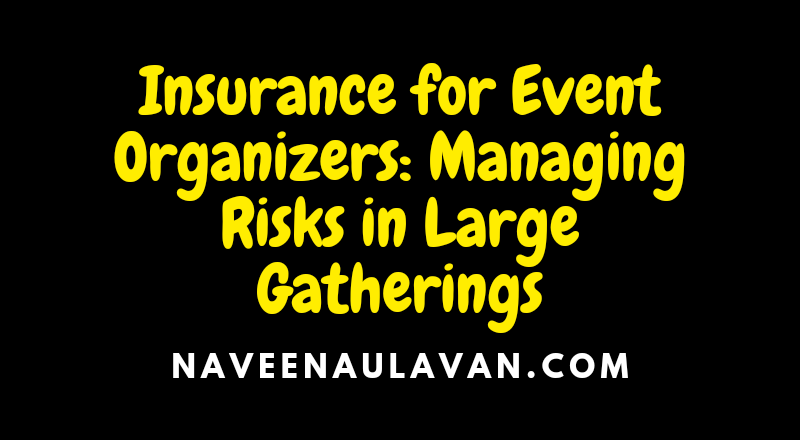Large gatherings and events come with various risks and uncertainties that event organizers need to address. From accidents and injuries to property damage and legal liabilities, organizing an event requires thorough risk management strategies. Among these strategies, having appropriate insurance coverage is crucial for protecting both event organizers and participants. In this article, we will explore the importance of insurance for event organizers and discuss how it can effectively manage risks in large gatherings.
Understanding the Risks in Event Organization
Event organizers face a wide range of risks, and identifying these risks is the first step towards effective risk management. Some of the common risks associated with organizing large gatherings include:
1. Accidents and Injuries
Large events often involve a high number of participants, which increases the likelihood of accidents and injuries. Slip and fall incidents, crowd surges, stage collapses, and equipment malfunctions are just a few examples of potential accidents that can occur. Event organizers must be prepared to handle such situations and have the necessary insurance coverage to mitigate the financial consequences.
2. Property Damage
Events frequently involve the use of rented venues, equipment, and infrastructure, making property damage a significant concern. Whether it is accidental damage to the event venue or equipment, event organizers can face substantial financial liabilities if they are not adequately covered by insurance. Additionally, weather-related damages such as storms or fires can cause significant losses if there is no insurance coverage in place.
3. Cancellation or Postponement
Unforeseen circumstances, such as extreme weather conditions, natural disasters, or public health emergencies, can force event organizers to cancel or postpone an event. In such cases, substantial financial losses could be incurred, including non-refundable deposits, marketing expenses, and lost ticket sales. Having appropriate insurance coverage can help mitigate these financial risks and provide compensation for the incurred expenses.
4. Legal Liabilities
Event organizers can face legal liabilities in various forms, including personal injury claims from participants, property damage claims from third parties, or copyright infringement issues. Without proper insurance coverage, event organizers may have to bear the burden of legal fees and potential settlements or judgments, which can be financially devastating.
The Role of Insurance for Event Organizers
Insurance serves as a vital risk management tool for event organizers. It provides financial protection against unforeseen events and helps event organizers to manage potential risks effectively. Here are some key types of insurance policies that event organizers should consider:
1. General Liability Insurance
General liability insurance is a fundamental coverage that all event organizers should have. It protects against third-party claims for bodily injury, property damage, and personal injury arising from the event. This insurance coverage is essential in case someone gets injured during the event or property damage occurs. It provides financial protection and helps fund legal defense costs if necessary.
2. Event Cancellation Insurance
Event cancellation insurance is designed to protect event organizers from financial losses in the event of a cancellation or postponement. It typically provides coverage for non-recoverable expenses, ticket refunds, and revenue losses. This insurance coverage is particularly important for events heavily dependent on ticket sales or sponsorships, where cancellation can result in substantial financial setbacks.
3. Property and Equipment Insurance
Property and equipment insurance provide coverage for event-related infrastructure, equipment, and rented venues. This insurance protects against losses or damages caused by accidents, theft, fire, or natural disasters. It is crucial to ensure that all rented equipment and infrastructure are adequately insured to avoid significant financial burdens in case of unexpected damage.
4. Workers’ Compensation Insurance
If event organizers employ staff or utilize volunteers, workers’ compensation insurance is essential. This insurance provides coverage for medical expenses, disability benefits, and lost wages in the event of work-related injuries or illnesses. It ensures that event organizers fulfill their legal obligations and avoid potential lawsuits arising from workplace accidents.
5. Liquor Liability Insurance
If alcohol is served or sold at the event, liquor liability insurance becomes necessary. This coverage protects event organizers from claims and lawsuits related to alcohol-related incidents, such as injuries or property damage caused by intoxicated individuals. Liquor liability insurance is especially important to mitigate the risks associated with alcohol consumption during large gatherings.
Conclusion
Managing risks in large gatherings requires a comprehensive approach, and insurance plays a significant role in ensuring financial protection for event organizers. Accidents, property damage, cancellation or postponement, and legal liabilities are just a few of the risks that event organizers face. By having appropriate insurance coverage, event organizers can manage these risks effectively and safeguard themselves against significant
